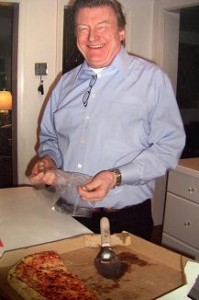Today is the third Sunday since Nate died, and each one has been the most difficult day of the week. He believed in a six day work week but was always with his family on Sundays, no matter what. Maybe that’s the reason its miserable to sit in church without him next to me and painful to eat Sunday brunch when he’s not at the head of the table. It’s distressing to see the empty chair where he used to read his Sunday papers and sad to order our traditional Sunday evening pizza without him managing the event.
The last three Sundays have been full of tearful moments and heavy grief. First choice would be to stay in bed curled up under the down comforter, cozy and warm in a familiar place. Even without Nate next to me, I would be alone rather than in public. The truth is, Nate’s death was only a blip on the screen for most people while it was an atomic bomb for me.
But that’s the way it goes. Logic flies out the window for the person who’s in the grieving process. I call it a process, because it takes a while to get through it. The other day I looked up the stages of grief, wanting to know where I was and where I’m headed. The seven stages are: 1) denial, 2) pain, 3) anger, 4) depression, 5) turning upward, 6) reconstructing life and 7) acceptance.
After studying the list and detailed descriptions of each stage, I concluded I’m in all of them simultaneously. Stage one, denial, is occurring when I expect Nate to walk in the front door with his empty coffee mug and say, “Hel-lo-oh” in the mini-song he used to sing each day. Stage two’s pain came in church this morning as I watched the couple in front of me hold hands and look at each other. Stage three, anger, is the one stage I haven’t yet experienced, but I’m on the alert for it.
Stage four, depression, is why I wanted to stay in bed this morning, and stage five, turning upward, is the peace I feel walking on the beach. Reconstructing life, the sixth stage, is what’s occurring when I project to filling out forms and wonder which box I’ll check: Mrs, Miss, or Ms. And the seventh stage, acceptance, is happening as we look through Nate’s personal financial records to find the data we need.
As for anger, who would be the recipient? Over the years, I’ve prayed many times asking God to keep me from ever being angry at him, no matter what circumstances would come. Sure, he could have healed Nate’s cancer on this earth rather than in heaven. Yes, he could have prevented Nate’s body from becoming sick in the first place. But as I’ve watched the Lord pour abundant blessings on our family in ways that would not have happened without the cancer, I can’t complain. Besides, Nate was able, by going to heaven, to take a pass on some of life’s toughest battles: increasing pressure in his law business, stenosis of his spine that would have caused a life long decline inch by inch, financial stress and the myriad difficulties of old age. How could I quibble with God over sparing him all of that?
So I suppose experiencing simultaneous grief stages is the way life will go for a while. It reminds me of a childhood game called “Fruit Basket Upset.” Everyone sat in chairs forming a circle around one person in the middle. If that person shouted, “Fruit Basket Upset!” everyone in the chairs jumped up and ran to a new chair. While they were all colliding in the middle, pandemonium reigned. And that part, the pandemonium, is what grieving a loved one is like.
The good news is that eventually everyone in the game finds a new chair, and order is restored. Life will, in due course, be like that for me. The fruit-basket-upset of grieving will change from a pandemonium of emotions to a new place in life’s circle. Even Sundays will once again become a day of joy and satisfaction. Friends who have already experienced widowhood tell me so, and I believe them.
“You [Lord] have turned my mourning into joyful dancing. You have taken away my clothes of mourning and clothed me with joy, that I might sing praises to you and not be silent. O Lord my God, I will give you thanks forever!” (Psalm 30:11-12)


 My sister and I took our dogs to the beach this afternoon to walk the wave line and enjoy the 5:20 sunset. While the dogs romped in the dunes, we watched the sky turn colors from the comfy perch of two abandoned chairs nestled in the beach grasses.
My sister and I took our dogs to the beach this afternoon to walk the wave line and enjoy the 5:20 sunset. While the dogs romped in the dunes, we watched the sky turn colors from the comfy perch of two abandoned chairs nestled in the beach grasses.